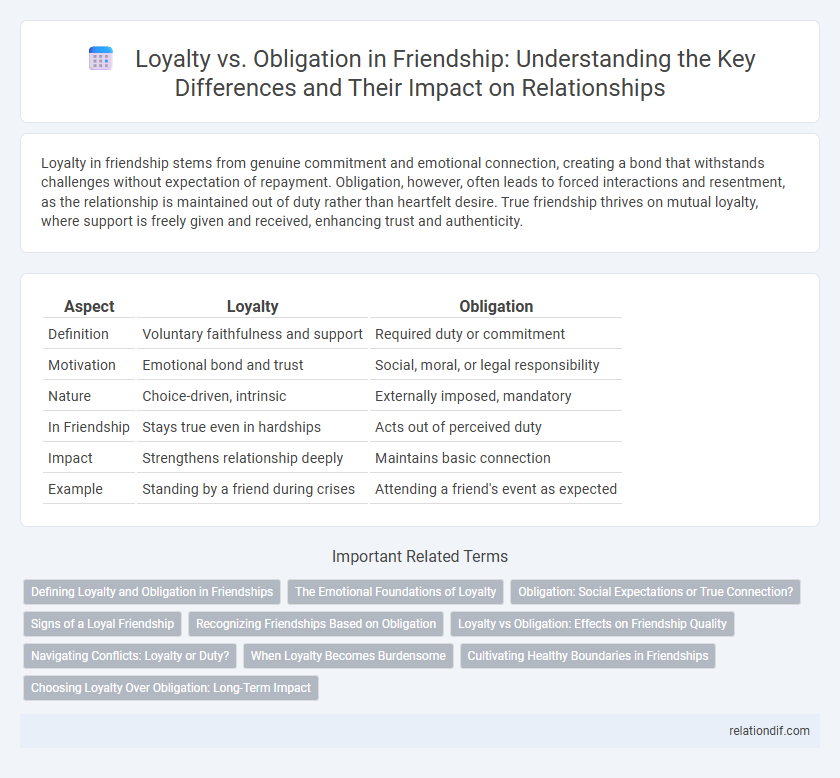Loyalty in friendship stems from genuine commitment and emotional connection, creating a bond that withstands challenges without expectation of repayment. Obligation, however, often leads to forced interactions and resentment, as the relationship is maintained out of duty rather than heartfelt desire. True friendship thrives on mutual loyalty, where support is freely given and received, enhancing trust and authenticity.
Table of Comparison
| Aspect | Loyalty | Obligation |
|---|---|---|
| Definition | Voluntary faithfulness and support | Required duty or commitment |
| Motivation | Emotional bond and trust | Social, moral, or legal responsibility |
| Nature | Choice-driven, intrinsic | Externally imposed, mandatory |
| In Friendship | Stays true even in hardships | Acts out of perceived duty |
| Impact | Strengthens relationship deeply | Maintains basic connection |
| Example | Standing by a friend during crises | Attending a friend's event as expected |
Defining Loyalty and Obligation in Friendships
Loyalty in friendships embodies a deep, unwavering commitment driven by genuine care and trust, while obligation stems from a sense of duty or external expectation. True loyalty enhances the emotional bond and fosters mutual support, whereas obligation can create pressure and diminish authentic connection. Understanding this distinction helps cultivate meaningful relationships based on voluntary dedication rather than mere responsibility.
The Emotional Foundations of Loyalty
Loyalty in friendship is deeply rooted in emotional bonds, where trust and mutual understanding create a sense of unwavering commitment. Unlike obligation, which is driven by external expectations or social duties, loyalty emerges from genuine affection and shared experiences. This emotional foundation fosters resilience in relationships, enabling friends to support each other through challenges without feeling burdened or compelled.
Obligation: Social Expectations or True Connection?
Obligation in friendship often stems from social expectations rather than genuine emotional bonds, leading individuals to maintain relationships out of duty rather than true connection. This distinction highlights how some friendships persist due to cultural norms or perceived responsibilities instead of mutual trust and loyalty. Understanding whether a friendship is driven by obligation or authentic connection influences its depth and long-term sustainability.
Signs of a Loyal Friendship
True loyalty in friendship is evident through consistent support during challenges, genuine concern for each other's well-being, and honest communication without judgment. Reliable friends prioritize your happiness and stand by you without expecting anything in return, distinguishing loyalty from mere obligation. Acts of trust, confidentiality, and unwavering presence serve as clear signs of a loyal friendship.
Recognizing Friendships Based on Obligation
Friendships rooted in obligation often lack the genuine emotional connection found in loyalty-driven bonds, revealing relationships maintained out of duty rather than true affection. Recognizing these friendships involves observing patterns of interaction where support feels transactional or compliance is motivated by social expectation instead of mutual care. Identifying obligation-based friendships is crucial for fostering authentic connections that thrive on trust, empathy, and voluntary commitment.
Loyalty vs Obligation: Effects on Friendship Quality
Loyalty in friendship fosters trust, emotional support, and resilience, creating a strong bond that endures challenges and nurtures mutual growth. Obligation, when perceived as duty rather than genuine care, can lead to resentment and superficial connections, weakening the friendship's depth and authenticity. Prioritizing loyalty over obligation enhances friendship quality by promoting sincere commitment and shared values.
Navigating Conflicts: Loyalty or Duty?
Navigating conflicts in friendships requires balancing loyalty and obligation, where loyalty stems from genuine emotional bonds and obligation arises from social expectations. True friendship thrives when loyalty guides actions, fostering trust and understanding, while duty without genuine care risks resentment and superficial connections. Prioritizing heartfelt loyalty during disputes strengthens relational resilience and promotes authentic reconciliation.
When Loyalty Becomes Burdensome
Loyalty in friendship transforms into a burden when it shifts from genuine commitment to an enforced obligation, causing emotional strain and resentment. True loyalty respects boundaries and allows for honest communication, whereas obligation often leads to one-sided sacrifices and unmet expectations. Understanding this distinction ensures friendships remain supportive rather than draining.
Cultivating Healthy Boundaries in Friendships
Loyalty in friendship thrives when healthy boundaries are respected, preventing feelings of obligation from overshadowing genuine connection. Establishing clear limits helps maintain trust and mutual respect, ensuring that support remains balanced rather than burdensome. Prioritizing open communication about needs and expectations fosters a sustainable friendship grounded in authenticity rather than duty.
Choosing Loyalty Over Obligation: Long-Term Impact
Choosing loyalty over obligation in friendships fosters deeper trust and lasting bonds, as loyalty reflects genuine commitment rather than mere duty. Loyal friends provide consistent support during challenges, enhancing emotional resilience and strengthening relational stability. Prioritizing loyalty encourages mutual understanding and authenticity, creating a foundation for enduring and meaningful connections.
loyalty vs obligation Infographic

 relationdif.com
relationdif.com